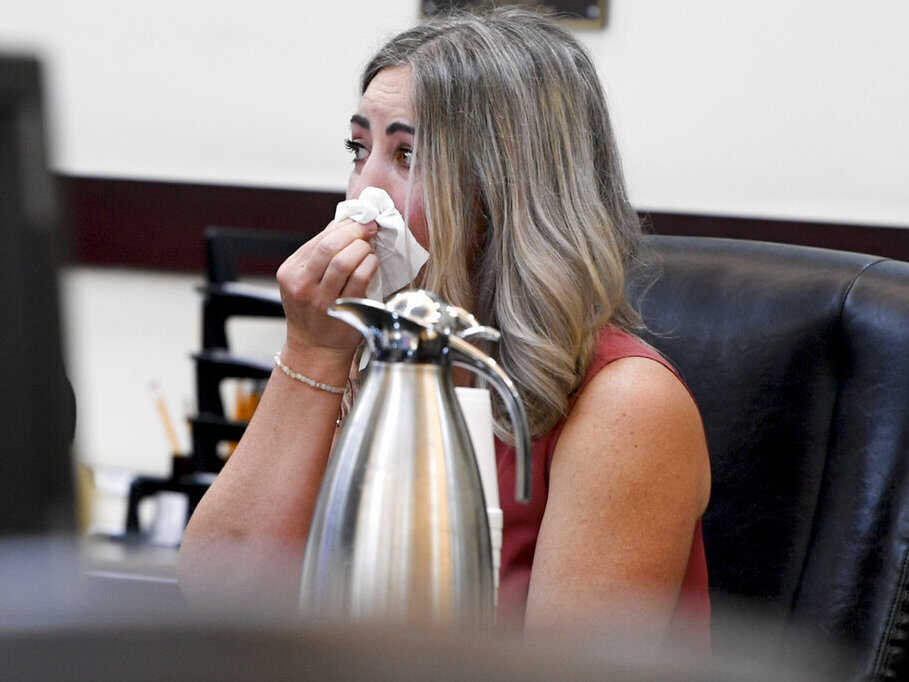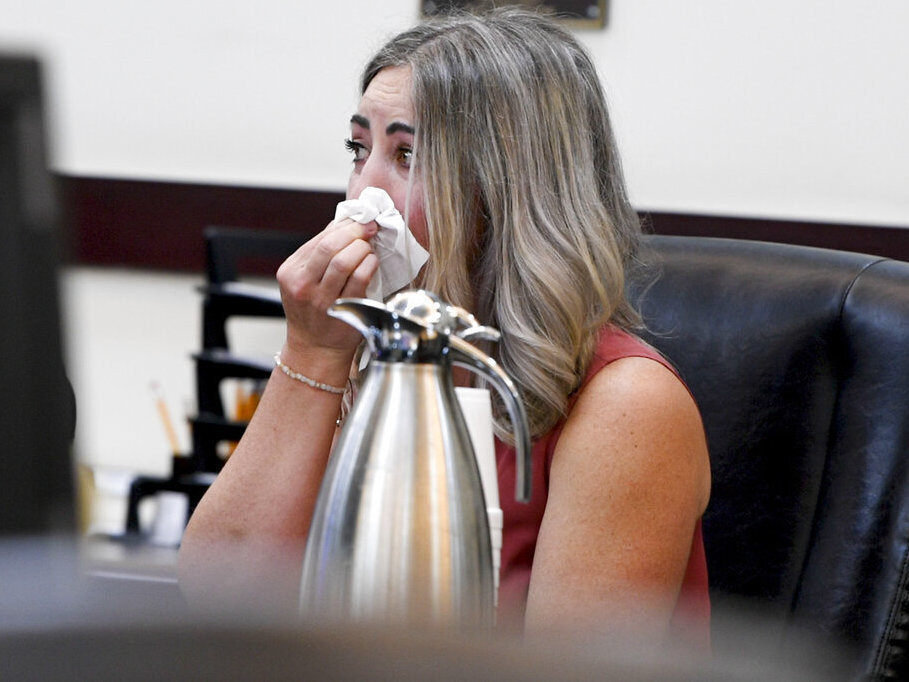Nurse sentenced to three years probation in fatal drug error : Shots

RaDonda Vaught listens to sufferer affect statements for the duration of her sentencing in Nashville. She was discovered responsible in March of criminally negligent murder and gross neglect of an impaired adult right after she unintentionally administered the wrong medicine.
Nicole Hester/AP
disguise caption
toggle caption
Nicole Hester/AP

RaDonda Vaught listens to victim impact statements all through her sentencing in Nashville. She was found responsible in March of criminally negligent homicide and gross neglect of an impaired adult immediately after she unintentionally administered the wrong medication.
Nicole Hester/AP
RaDonda Vaught, a previous Tennessee nurse convicted of two felonies for a lethal drug mistake, whose demo grew to become a rallying cry for nurses fearful of the criminalization of medical blunders, will not be needed to shell out any time in prison.
Davidson County legal court Choose Jennifer Smith on Friday granted Vaught a judicial diversion, which signifies her conviction will be expunged if she completes a 3-12 months probation.
Smith said the Murphey relatives experienced a “awful decline” and “very little that happens right here right now can relieve that reduction.”
“Miss out on Vaught is effectively conscious of the seriousness of the offense,” Smith explained. “She credibly expressed regret in this courtroom.”
The decide observed that Vaught experienced no felony report, has been eradicated from the health and fitness care setting, and will in no way apply nursing once more. The choose also explained, “This was a horrible, awful miscalculation and there have been implications to the defendant.”
As the sentence was study, cheers erupted from a group of hundreds of purple-clad protesters who gathered exterior the courthouse in opposition to Vaught’s prosecution.
Vaught, 38, a previous nurse at Vanderbilt University Clinical Center in Nashville, faced up to 8 years in jail. In March she was convicted of criminally negligent homicide and gross neglect of an impaired adult for the 2017 death of 75-12 months-old patient Charlene Murphey. Murphey was prescribed Versed, a sedative, but Vaught inadvertently gave her a fatal dose of vecuronium, a potent paralyzer.
Charlene Murphey’s son, Michael Murphey, testified at Friday’s sentencing hearing that his relatives remains devastated by the sudden loss of life of their matriarch. She was “a incredibly forgiving individual” who would not want Vaught to provide any prison time, he reported, but his widower father needed Vaught to obtain “the utmost sentence.”
“My father suffers each individual day from this,” Michael Murphey claimed. “He goes out to the graveyard three to four instances a 7 days and just sits out there and cries.”
Vaught’s scenario stands out due to the fact professional medical mistakes ― even deadly types ― are usually in the purview of condition health care boards and lawsuits are virtually never prosecuted in legal courtroom.
The Davidson County district attorney’s office, which did not advocate for any certain sentence or oppose probation, has described Vaught’s circumstance as an indictment of one particular careless nurse, not the whole nursing job. Prosecutors argued in trial that Vaught neglected many warning indicators when she grabbed the erroneous drug, which includes failing to notice Versed is a liquid and vecuronium is a powder.
Vaught admitted her mistake right after the combine-up was found out, and her protection mainly concentrated on arguments that an honest mistake really should not represent a crime.
During the hearing on Friday, Vaught reported she was without end modified by Murphey’s death and was “open and truthful” about her mistake in an effort and hard work to avert upcoming issues by other nurses. Vaught also reported there was no community desire in sentencing her to jail mainly because she could not possibly re-offend just after her nursing license was revoked.
“I have shed considerably more than just my nursing license and my job. I will never ever be the exact human being,” Vaught reported, her voice quivering as she began to cry. “When Ms. Murphey died, a aspect of me died with her.”
At 1 stage throughout her statement, Vaught turned to facial area Murphey’s household, apologizing for each the lethal mistake and how the community marketing campaign versus her prosecution could have forced the family to relive their decline.
“You you should not have earned this,” Vaught mentioned. “I hope it does not arrive throughout as men and women forgetting your beloved one. … I believe we are just in the center of units that don’t fully grasp 1 a further.”
Prosecutors also argued at demo that Vaught circumvented safeguards by switching the hospital’s computerized treatment cupboard into “override” method, which made it feasible to withdraw remedies not approved to Murphey, which includes vecuronium. Other nurses and nursing specialists have explained to KHN that overrides are routinely employed in numerous hospitals to obtain medicine swiftly.
Theresa Collins, a vacation nurse from Ga who closely adopted the demo, stated she will no lengthier use the characteristic, even if it delays patients’ treatment, soon after prosecutors argued it proved Vaught’s recklessness.
“I am not going to override just about anything past simple saline. I just don’t sense snug executing it any more,” Collins said. “When you criminalize what overall health treatment staff do, it changes the full ballgame.”

Danielle Threet, remaining, a nurse and friend of RaDonda Vaught, stands subsequent to her mother, Alex Threet, at a rally in assistance of Vaught outside the Davidson County Courthouse in Nashville in advance of sentencing.
Brett Kelman/Kaiser Wellbeing Information
cover caption
toggle caption
Brett Kelman/Kaiser Health News

Danielle Threet, still left, a nurse and good friend of RaDonda Vaught, stands following to her mother, Alex Threet, at a rally in assistance of Vaught outside the house the Davidson County Courthouse in Nashville ahead of sentencing.
Brett Kelman/Kaiser Wellbeing Information
Vaught’s prosecution drew condemnation from nursing and clinical companies that stated the case’s perilous precedent would worsen the nursing lack and make nurses much less forthcoming about mistakes.
The circumstance also spurred substantial backlash on social media as nurses streamed the trial by Fb and rallied guiding Vaught on TikTok. That outrage motivated Friday’s protest in Nashville, which drew supporters from as significantly as Massachusetts, Wisconsin and Nevada.
Among the these protesters was David Peterson, a nurse who marched Thursday in Washington, D.C., to demand from customers wellbeing care reforms and safer nurse-affected person staffing ratios, then drove through the night to Nashville and slept in his vehicle so he could protest Vaught’s sentencing. The functions have been inherently intertwined, he reported.
“The points getting protested in Washington, techniques in spot for the reason that of poor staffing in hospitals, which is just what occurred to RaDonda. And it puts every single nurse at chance each individual working day,” Peterson said. “It is really lead to and result.”
Tina Vinsant, a Knoxville nurse and podcaster who structured the Nashville protest, claimed the team had spoken with Tennessee lawmakers about legislation to shield nurses from felony prosecution for healthcare glitches and would go after equivalent payments “in just about every condition.”
Vinsant stated they would pursue this marketing campaign even although Vaught was not sent to jail.
“She should not have been charged in the to start with put,” Vinsant mentioned. “I want her not to provide jail time, of system, but the sentence does not definitely have an effect on in which we go from below.”
Janis Peterson, a a short while ago retired ICU nurse from Massachusetts, stated she attended the protest immediately after recognizing in Vaught’s case the all-as well-acquainted difficulties from her individual nursing career. Peterson’s panic was a prevalent chorus among nurses: “It could have been me.”
“And if it was me, and I looked out that window and noticed 1,000 individuals who supported me, I’d truly feel improved,” she explained. “Due to the fact for just about every one of all those 1,000, there are most likely 10 a lot more who help her but couldn’t come.”
Nashville Public Radio’s Blake Farmer contributed to this report.
KHN (Kaiser Health and fitness Information) is a countrywide newsroom that makes in-depth journalism about health challenges. It is an editorially impartial operating system of KFF (Kaiser Family members Basis).







